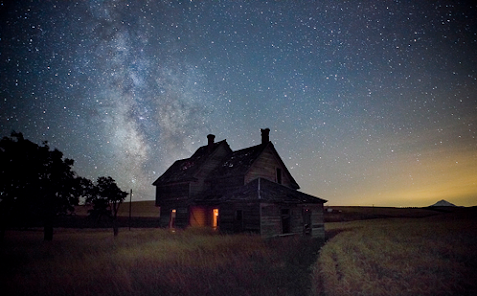"The System's Self-Destruct Sequence
Cannot Be Turned Off"
by Charles Hugh Smith
"We're all familiar with the plot device of the self-destruct sequence counting down while our hero/heroine frantically tries to find the kill switch that turns it off. The system - however we choose to describe it - is self-destructing and there's no switch to turn it off.
We're drawn to the notion that cabals and conspiracies are the root source of the system's ills. If these cabals were exposed and disempowered, then the system would quickly right itself and all would be well again.Cabals and conspiracies are not the source, they're a symptom of a deeper, structural self-destruct mechanism, a mechanism we take for granted as the way the world works.
Regardless of ideological label - capitalist, socialist, communist - all systems are markets of some kind with producers, sellers and buyers/consumers. The market may be more or less open, or more or less controlled by the state, warlords or cartels, but in all cases there are producers, sellers and consumers. In all cases, neither the producer, the seller nor the consumer have any responsibility for the downstream consequences of what's produced, sold and purchased. Every participant is incentivized to maximize their self-interest without regard for the future consequences of this pursuit of self-interest.
The producer of the plastic bottle has no responsibility for what happens to the bottle after production, the seller has no responsibility for what happens to the bottle after it's sold, and the consumer who tosses it in the river after consuming the contents has no responsibility for what happens to the bottle once they're done consuming the product.
The market has no internal, intrinsic responsibility for the consequences of narrow self-interest nor any mechanism that looks beyond the present. The market is blind to future consequences, and imposes no responsibility to do so on any participant.
The only possible result of this system is self-destruction. Consider the Great Pacific Garbage Gyre, the poetic name for a floating mass of plastic and other waste generated by the "growth at any cost" global economy roughly the size of Texas. (See chart below.) This is not the only garbage patch in the planet's oceans; it's merely one of the biggest.
Who cares about a floating island of garbage? It's harmless, right? Indeed. Can the same be said of the "forever" chemicals, the depleted freshwater aquifers, the mountains of electronic and other waste leaking toxic sludge and the rest of the consequences of a system that is blind to everything but "growth at any cost," self-interest and the eternal Now?
Cabals and conspiracies attract our attention because they are intentionally cloaking the destructive consequences their self-interest is passing on to others. The tobacco cabal worked diligently for decades to obfuscate the deadly consequences of smoking, as the means of maximizing their profits/self-interest.
So let's identify the cabal that intentionally created the Great Pacific Garbage Gyre to further their self-interest. Do we finger the producers of the 300 million tons of plastics produced annually, or the corporations that sold the 300 million tons of plastics, or the consumers who bought the 300 million tons of plastics?
The waste stream is generated by the system, not a cabal, and the system is constructed of values and what I call the mythology of Progress, a mythology of make-believe and play-acting, in which we watch a video of a group recycling a tiny sliver of the waste generated by global tourism and then declare, "See? Technology is solving the problems created by the system! No worries, it will all get solved by new technologies." Absolved by this magical-thinking, we're free to continue pursuing our part of consequence-free "growth at any cost." This is the internal logic of the market-system, and it operates the same under any ideological label.
In theory, political rulers are supposed to the future consequences, but rulers only rule by authority granted in the present moment. If their supporters are forced to sacrifice for some distant benefit, they will find someone else to support.
Every civilization that produces "forever" goods ends up creating mountains of waste. Broken pottery shards pile up into artificial hills. But the scale of the modern system is so colossal that the consequences are now planetary, affecting our health and complex systems we don't fully understand, much less control. The artificial hill of pottery shards is puny and localized; the consequences of our system will bring down the system in ways the system is completely blind to.
Even if technology consolidated the Great Pacific Garbage Gyre at enormous expense, what would we do with the artificial garbage island? And since the system spews out 300 million tons of new plastic every year, a new Great Pacific Garbage Gyre will soon form.
There is no "off" switch on the system's self-destruct sequence. We'll only notice, or care, when the system started breaking down under the crushing weight of the consequences that have been piling up and ignored with play-acting solutions such as recycling."
























